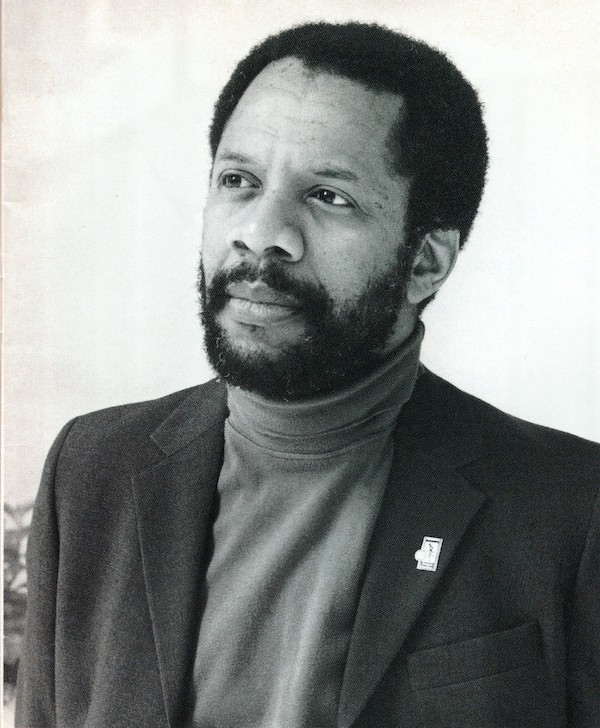
Jim Pines (1945-2023) was instrumental in helping so many Black moving image artists to come into their own in the UK, and promoting the discussion and appreciation of Black film both past and present internationally, that it is impossible to quantify just how important his contribution was to Black filmmaking particularly in the UK.
Pines, who was African American, was heavily influenced by the American civil rights movement of the 60s. Born in Boston Massachusetts in 1945 and fostered throughout his childhood, he nevertheless excelled, winning a National Science Foundation State Prize for Massachusetts. He applied to do a college degree but was turned down because of his “cultural background”. Concluding that America had nothing to offer him, in 1965 he bought a one-way ticket and flew to London on his own and, in his words, “I reinvented myself”.
In 1969 he was appointed to the role of technical officer at the British Film Institute, which gave him access to countless films, through which he developed his thinking on black film.
In June 1971 Pines programmed the NFT film season Blacks in the Cinema: The changing image 1947-70, and accompanied it with a booklet Blacks in the Cinema: The Changing Image. In his essay he wrote: “The black media-image serves a purpose; and once that purpose is understood, one can disrupt the system producing it.”
His first book, in 1975, was Blacks in Films: A survey of racial themes and images in the American film. He discussed the ways in which films create racial images, and the various elements cinema employs to create racial myths and conceptions about black people. Later that year the London School of Economics accepted his application to do a BSc (Hons) in Social Anthropology. He graduated in 1978.
Over the following three decades Jim Pines organised or attended numerous film festivals and conferences to promote and celebrate Black film, wrote extensively, presented programmes on television and radio and was often called upon for his insight.
From 1982-84 Jim worked at the Commonwealth Institute, first as a programme coordinator, organising the Black Film Festival, and then as its first Fellow in Non-European Film and Television. He then went back to the British Film Institute as their Ethnic Film and Television Adviser, during which time he organised and attended conferences and continued his writing including producing substantial educational material which can be found in film and educational resource centres far and wide.
He co-authored many seminal publications: these included editing Questions of Third Cinema with his great friend Paul Willemen which was named the outstanding academic book of 1990 by the Association of College and Research Libraries in the USA. He contributed to many major publications such as The Oxford History of World Cinema.
In 1994 he became a senior lecturer in Media Film at what is now the University of Bedfordshire. As there were so few black lecturers in film and media studies, students from other universities also approached him for advice and guidance, some following their lecturers’ recommendations.
For several years he co-edited the independent British critical film journal Framework with Willemen. He edited Black and White in Colour: Black People in British Television since 1936 to accompany the television series and presented the Channel 4 series Cinema from Three Continents in 1989.
His voice was also prominent at major cultural and educational events, for example where he eloquently chaired the film panel at the first and iconic Black and Third World Book Fair. It was a major international gathering of cultural activists, all forms of artists in every sphere, writers and performers providing some of the richest gatherings of those decades.
Throughout his life, Pines always went out of his way to nurture new Black talent. Sir John Akomfrah recalled that he first went to see Jim Pines in 1982 after John and colleagues had formed the Black Audio Film Collective; they had been turned down for funding by the Arts Council and by the BFI and so they asked Jim what they should do. John says: “That began a kind of dialogue with him that lasted I think about 12 years. And in that 12 years he oversaw the emergence of a movement of young black kids from across the country, all of whom could call him up, and say ‘I’m in Huddersfield and I want to set up a black film group, what do you think I should do?’ and he’d always have time for you. He’d always find the space for you.
“His role in our evolution is immeasurable and incalculable.”
Written by Janice Turner, Jim’s wife
Books can be found at: www.goodreads.com/author/list/1150754.Jim_Pines
Filmography:
2007: TV’s Black Pioneers: cast member
2005: Jim Pines, June Givanni, John Akomfrah: interviewee
1992: Black and White in Colour: Television, Memory, Race 1968-82: cultural critic
1991: Jim Pines Black and White in Colour (rushes) reel 40: interviewee
1988: The Media Show 29/03/88: onscreen participant
1980: Weekend – screenplay
1977: Breaking the Boundaries: director
Audio:
BBC Radio 2: Great Lives – Richard Pryor discussion with David Lammy and Jim Pines
https://www.bbc.co.uk/sounds/play/b00cyd3x
The Negro Soldier 2010 – presentation by Jim Pines following a screening of the film at London’s BFI Southbank, now included in the Blu-Ray package Tokyo Joe by Powerhouse Films:
https://www.powerhousefilms.co.uk/products/tokyo-joe-bd?srsltid=AfmBOopsvgU_hFBJaoxSeMXL7N828m1lNj0lSU6YigDxDZLtSP2Vpgf-